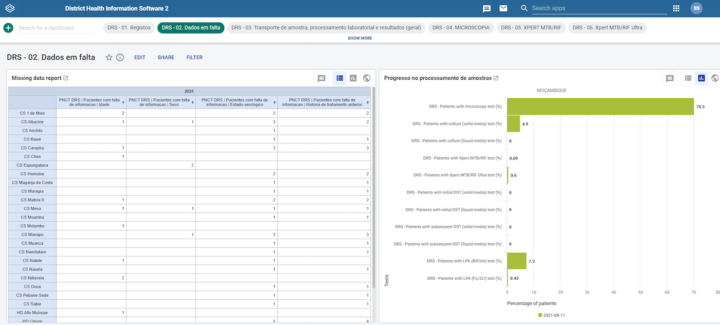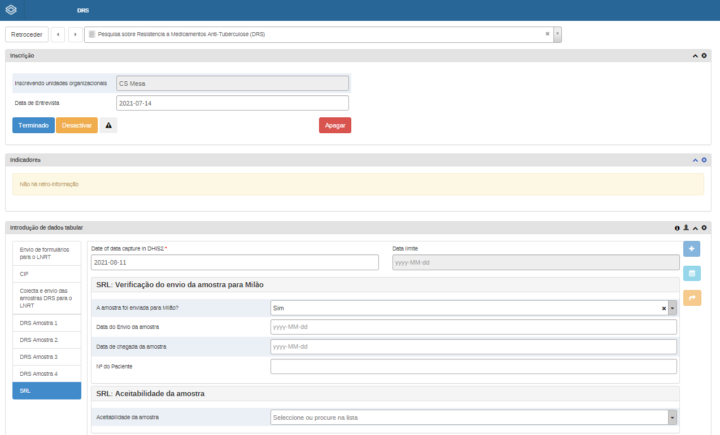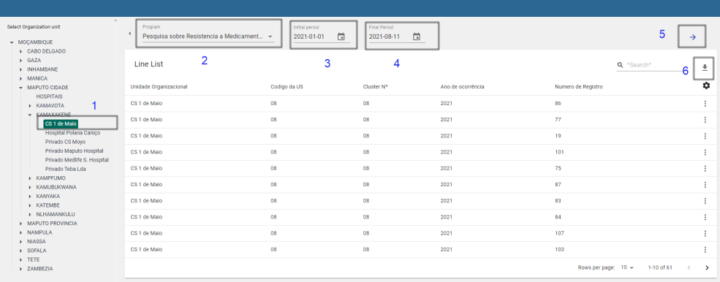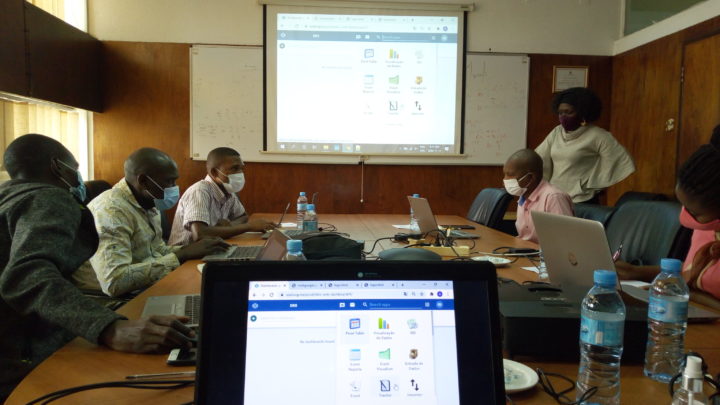Esta página ha sido traducida de manera automática y puede contener errores
Estudio de los conglomerados de tuberculosis farmacorresistente en Mozambique con DHIS2 Tracker
Un proyecto de investigación de seis meses rastrea los datos de casos en DHIS2 para saber más sobre la resistencia a la medicación contra la tuberculosis en 2000 pacientes
La tuberculosis farmacorresistente (DR-TB) es reconocida por la Organización Mundial de la Salud como una crisis de salud pública y una amenaza para la seguridad sanitaria, tanto en África como en otras regiones, y ha sido identificada como un área de investigación prioritaria. El Programa Nacional de Tuberculosis (PNT) de Mozambique utiliza DHIS2 para supervisar la prevalencia de la tuberculosis en todo el país, principalmente a través de la recopilación rutinaria de datos agregados, que ahora se está complementando con la implementación en curso de Tracker para datos basados en casos. En 2020, el PNCT de Mozambique se asoció con el Fondo Mundial de Lucha contra el Sida, la Tuberculosis y la Malaria para poner en marcha un estudio de seis meses sobre la tuberculosis farmacorresistente con el objetivo de registrar y controlar a unos 2.000 pacientes farmacorresistentes en 50 grupos de todo el país.
Con la ayuda de la OMS y del Programa de Sistemas de Información Sanitaria (HISP) de la Universidad de Oslo, y con el apoyo de Saudigitus(HISP Mozambique), se adaptó e implantó un sistema DHIS2 Tracker para ayudar a realizar pruebas, seguir y analizar estos casos de TB. Este proyecto sirve como una fuente útil de datos de investigación, y como un piloto exitoso de un paquete estandarizado de metadatos TB DRS para DHIS2 que se adhiere a las directrices de la OMS y puede ser descargado y utilizado por cualquier país del mundo.

Utilización de DHIS2 Tracker y de la aplicación personalizada de listado de líneas para apoyar las necesidades de seguimiento y análisis del laboratorio.
El programa nacional de TB de Mozambique comenzó a discutir la encuesta TB DRS en noviembre de 2019. El objetivo era realizar un estudio para evaluar la prevalencia de la resistencia a los medicamentos de los casos de TB, con un seguimiento de la resistencia a medicamentos específicos a nivel de conglomerado y nacional. Se identificaron aproximadamente 2.000 pacientes con TB farmacorresistente y se introdujeron como entidades rastreadas en el rastreador DHIS2 TB DRS creado para esta encuesta, que incluye alrededor de 325 variables (elementos de datos) para cada paciente. Se recogen cuatro muestras de análisis de cada uno de los pacientes y se les asignan identificadores únicos en Tracker. Estas muestras se dividen y se envían a laboratorios distintos para su procesamiento (a nivel local en la agrupación, a nivel nacional y en un laboratorio de Milán para una validación adicional), de modo que los resultados puedan compararse para una mayor precisión. El hecho de que cada muestra esté vinculada a un paciente concreto en Tracker permite al equipo nacional realizar un seguimiento específico en caso de que haya problemas con una muestra o falten datos sobre un paciente.

Saudigitus impartió formación al equipo de TB a nivel nacional sobre la introducción de datos de los formularios de recogida en papel en el sistema Tracker, y también ha trabajado con ellos para configurar las herramientas de análisis dentro del sistema para satisfacer sus requisitos de supervisión y elaboración de informes. Esto incluye la creación de cuadros de mando dentro de DHIS2 que muestren los indicadores más relevantes para el equipo de Mozambique, como el número de pacientes inscritos, las muestras recogidas y la fecha de procesamiento, el tiempo transcurrido desde la recogida de muestras hasta el laboratorio y el porcentaje de muestras rechazadas.
Saudigitus también ha desarrollado una aplicación web personalizada que permite al PNCT generar un listado de líneas en formato Excel con la opción de seleccionar entre todas las variables incluidas en las etapas del programa y mostrar sólo las variables y atributos deseados (dentro de la aplicación genérica Tracker, las variables pueden seleccionarse y mostrarse en listados de líneas por etapa del programa), de modo que podrían ver todos sus indicadores en un solo lugar. El éxito del despliegue de esta aplicación permite al equipo nacional de TB dejar de introducir datos por duplicado en Excel y Tracker, lo que ahorra tiempo y agiliza sus procesos.

Aprovechar la experiencia y la capacidad local de la encuesta DRS de TB para apoyar el despliegue del Rastreador en todos los programas de salud.
Antes del inicio de la encuesta TB DRS, el programa de tuberculosis de Mozambique ya había estado utilizando DHIS2 para supervisar a los pacientes simples y farmacorresistentes utilizando DHIS2 para programas agregados y de seguimiento de forma paralela. El Fondo Mundial prestó apoyo para el despliegue de DHIS2 en todos los centros de TB del país, incluido el suministro de infraestructura de apoyo, como dispositivos móviles para la recopilación de datos (tabletas) e Internet. Sin embargo, el despliegue nacional de DHIS2 TB Tracker se había enfrentado a algunos problemas de aplicación, y algunos centros aún no habían empezado a utilizarlo cuando comenzó la encuesta TB DRS. El uso con éxito de un programa Tracker independiente para esta encuesta ha ayudado a crear una aceptación adicional de Tracker entre las partes interesadas del programa nacional de TB en Mozambique, ya que ha demostrado cómo Tracker permite una vigilancia completa de la TB. Además, la formación impartida por Saudigitus ha contribuido a crear una capacidad técnica en el equipo nacional de TB que puede aprovecharse en todos los programas.

Una vez que se haya completado la implementación del TB Tracker estándar, Mozambique planea vincular el TB DRS Tracker a su sistema general para facilitar la supervisión, el análisis y el seguimiento de todos los programas. Saudigitus ya ha sentado las bases para esta integración, por ejemplo configurando el TB DRS Tracker para que incluya identificadores únicos para los grupos y los pacientes que comparten las dos bases de datos. Además de TB, en Mozambique se están llevando a cabo otros despliegues del Rastreador. El programa EPI está implementando el paquete de vacunas DHIS2 COVID-19 y está en proceso de implementar el eRegistro DHIS2 para inmunización (incluyendo HPV, BCG, etc.) utilizando Tracker. La Unidad Nacional de Vigilancia de Enfermedades está trabajando en la ampliación de su aplicación DHIS2 COVID-19 para incluir programas eIDSR (vigilancia y respuesta electrónicas integradas a las enfermedades) para enfermedades adicionales como el tétanos neonatal, la fiebre amarilla y el sarampión. Mientras tanto, el Ministerio de Sanidad ya utiliza el Rastreador en su sistema nacional de información sobre la malaria para encuestas y supervisión, y ahora lo está ampliando al seguimiento de casos individuales de malaria a nivel comunitario.
Lo aprendido en Mozambique contribuye al desarrollo de un paquete mundial de DRS para la TB – y al bien mundial
La configuración del TB DRS Tracker utilizada en Mozambique se desarrolló en colaboración con HISP UiO basándose en los estándares globales de la OMS. La prueba piloto de esta configuración en Mozambique proporcionó valiosas ideas y comentarios que se utilizaron para perfeccionarla, que ahora está disponible como un paquete de metadatos preconfigurado que puede descargarse e instalarse en cualquier sistema DHIS2, donde puede configurarse aún más para satisfacer las necesidades locales. Visite la página de descargas de paquetes de metadatos para obtener más información sobre el diseño de los paquetes, instrucciones de instalación y enlaces a los archivos descargables.


